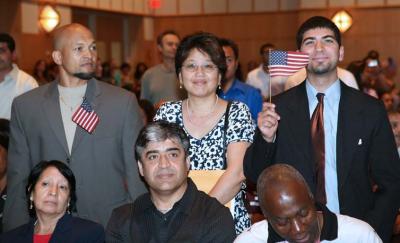October 19, 2016
 Naturalization ceremony at JFK LibraryAs one of my first official duties as executive director of the John F. Kennedy Library Foundation, I had the honor of welcoming 208 individuals from countries as diverse as Albania to Zimbabwe to the John F. Kennedy Presidential Library and Museum in Boston’s Dorchester neighborhood as they pledged their oath of allegiance and became naturalized citizens of the United States of America.
Naturalization ceremony at JFK LibraryAs one of my first official duties as executive director of the John F. Kennedy Library Foundation, I had the honor of welcoming 208 individuals from countries as diverse as Albania to Zimbabwe to the John F. Kennedy Presidential Library and Museum in Boston’s Dorchester neighborhood as they pledged their oath of allegiance and became naturalized citizens of the United States of America.
These men and women came from a multitude of countries for a multitude of reasons. They came to escape war and civil conflict. They came to be free of political, racial, or religious persecution. They came to seek economic opportunity, or to reunite with family. It was an extraordinary privilege to bear witness to their first of many acts of citizenship.
The guest speaker at the ceremony was Sayon Soeun, a Lowell resident who was kidnapped at age six by the Khmer Rouge regime in Cambodia and forced to become a child soldier. He endured years of cruelty and servitude before he ended up in an orphanage in a refugee camp, where his hardship continued.
When he was 15, he was adopted by a Connecticut family, and he came to the United States to start a new life.
Sayon’s journey from child soldier to American citizen is a powerful example of the difficulties faced by many who immigrate to the United States. His story and the stories of the 208 new US citizens are compelling in their own right. But theirs are also new chapters in our singular American story, and their greatest pages may still be unwritten. Amid a national debate about immigration and the contributions of immigrants, let us remember John F. Kennedy’s example, a story told through documents, historic interviews and exhibitions at the JFK Library and Museum.
Our 35th president, he was the grandson of Irish immigrants who came to the United States seeking relief from the Irish famine. In the US, those grandparents first worked as coopers, clerks, and tavern owners. As they built their new lives, like so many other immigrants from so many other places, they embraced the responsibilities of American citizenship along with its privileges. They became public servants. Within two generations, this family of Irish immigrants, once common targets of discrimination, would include the first Catholic president.
John F. Kennedy’s own public service legacy is informed by his family’s immigrant experience. Many of the groundbreaking programs he championed, such as the Peace Corps and the Alliance for Progress, reflected his sense that the greatest measure of American peace and prosperity would come from engagement with the world and a genuine effort to understand its many cultures and traditions.
In subsequent generations, the Fitzgeralds and the Kennedys have gone on to serve in public roles at all levels and sectors of society. They have made, and continue to make, important contributions as elected officials, diplomats, non-profit leaders. In particular, they have endeavored in countless ways to give voice to the voiceless. Their collective service is an expression of civic duty with deep roots in the immigrant experience.
The example of the Kennedy family is a remarkable American immigrant story. But while better known than most, it is not unique. The contributions of immigrants to American excellence, whether in public service or business, arts or sciences, are too numerous to count. In “A Nation of Immigrants,” Kennedy understood that, like his own grandparents, “Every ethnic minority, in seeking its own freedom, helped strengthen the fabric of American life… Similarly, every aspect of the American economy has profited from the contributions of immigrants.”
Today, our tradition of welcoming new citizens remains not only an act of humanity and principle, but also an act of self-interest. As we welcome these 208 new fellow US citizens, we look forward to the contributions that they, and their children and grandchildren, will make to American life. And just as we celebrate the story of one immigrant family at the JFK Library and Museum, we look forward to the possibility that the child or grandchild of one of these new citizens might one day have his or her own presidential library, adding a new chapter to this great American story.

